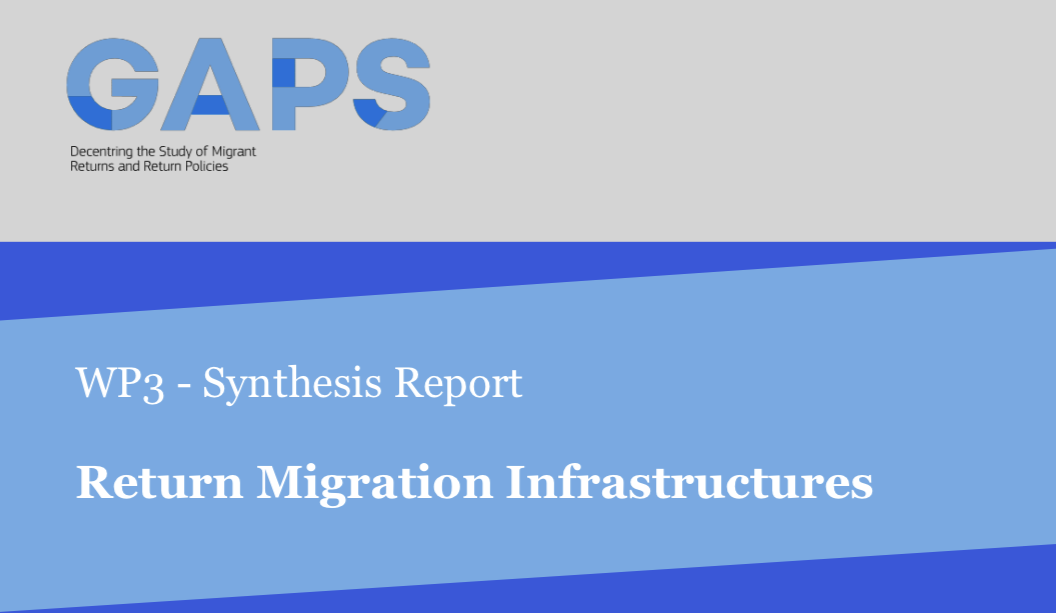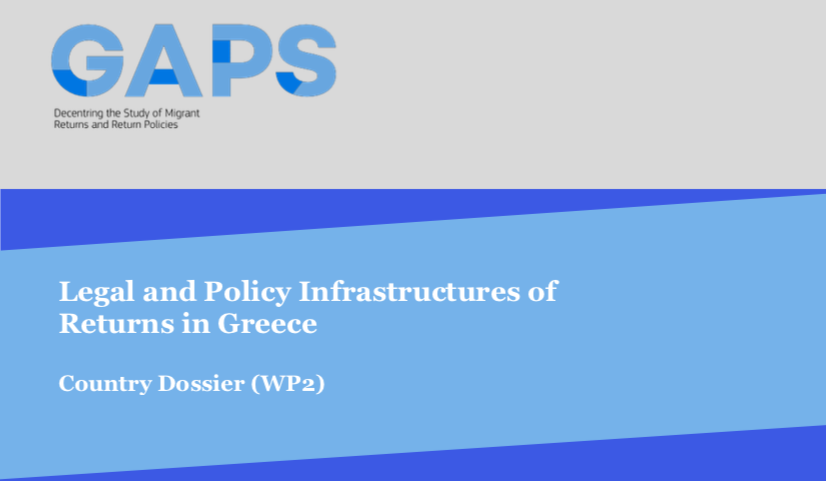Country Profile
GAPs Country Profile: Greece / Blog Posts
Presentation of the Work of EKKE Team Member Timokleia Psallidaki
by: Timokleia Psallidaki | National Centre for Social Research, EKKE
Timokleia Psallidaki is a member of the GAPs research team in Greece at the National Centre for Social Research (EKKE). She is a PhD candidate in Migration Studies and Human Geography at the Department of Urban and Regional Planning, School of Architecture, National Technical University of Athens (NTUA). Her research interests include migration, border transformations, practices of migrants’ settlement in the city, socio-spatial inequalities, European migration policies, mobility, and precarity. During my postgraduate studies in Urban and Regional Planning at NTUA, I engaged with critical geography perspectives that conceptualize space as a relational entity—one shaped by interconnections, multiplicity, and ongoing interactions between global and local dynamics…
Irregularisation as a process reproduced through the asylum system in Greece.
by: Eva Papatzani, George Kandylis, Penny Koutrolikou, Panos Hatziprokopiou, | National Centre for Social Research, EKKE
In the context of return migration from Greece, whether considered through the legal and institutional framework or the research on the ‘Return Migration Infrastructures’, the issue of regularity versus irregularity is inescapable. Irregularity has become a central concept in dominant public discourses about migration, often defined in opposition to regularity—or, more specifically, legality. By equating irregularity with illegality, this binary logic is used to stigmatize migrants as ‘threats’ to national and EU social and political structures. This oversimplification, however, neglects the complex ways in which irregularity is not simply a status but a process shaped by laws and institutional practices…
Quis Custodiet Ipsos Custodes? Managing Immigrant and Refugees’ Biometric Data in the Age of Artificial Intelligence.
by: Angelo Tramountanis | National Centre for Social Research, EKKE
In April 2024, the Hellenic Data Protection Authority issued a fine of €175,000 to the Greek Ministry of Migration and Asylum, due to non-compliance with data protection regulations concerning the operation of new migrant detention centers on the Aegean islands. This marks the highest penalty ever placed on a Greek public body. Specifically, the violations were linked to provisions governing two surveillance systems implemented in the centres titled "Centaur" and "Hyperion”. This fine yet again brings to prominence the ongoing debate surrounding the implications from implementing new digital technologies, particularly Artificial Intelligence (AI)…
Materials matter! Preliminary Research Findings on Return Migration Infrastructures in Greece.
by: George Kandylis, Eva Papatzani, Panos Hatziprokopiou, | National Centre for Social Research, EKKE
In early September 2023, the research team of the National Centre for Social Research (EKKE) started fieldwork in Greece within the scope of the GAPs project (entitled “De-centring the Study of Migrant Returns and Readmission Policies in Europe and Beyond”), particularly focusing on Return Migration Infrastructures (RMIs). Research on RMIs aims to bring to the fore how return migration governance is put into practice, by focusing on: a) the actors involved in the operation of returns, their relationships and networks, b) their everyday practices and the different steps constituting the return process, and c) the materials and technologies that shape (either facilitate or undermine) the ways in which returns take place on the ground…
Thinking the Pylos Shipwreck: Europe’s “shield” or Europe’s graveyard
by: Eva Papatzani, Panos Hatziprokopiou, Penny Koutrolikou | National Centre for Social Research, EKKE
The first months of the implementation of the GAPs project in Greece coincided with the Pylos shipwreck. On the 14th June 2023, the flagless vessel named “Adriana” sank off the coast of Pylos, in Southwestern Greece in an attempt to cross the Mediterranean Sea and reach Italy. As Eastern Mediterranean sea routes are more tightly controlled, other, more dangerous routes open up in order to avoid arrest and/or deportations and pushbacks. The ship departed from Libya carrying around 750 people, mainly from Pakistan, Egypt, and Syria, as well as Palestine and Afghanistan. It capsized 87 kilometers off the Greek coast, in international waters but, particularly, in the Greek Search and Rescue (SAR) zone. From all its passengers, only 104 people, exclusively men, survived, while the bodies of many, especially of those who found shelter at the bottom of the ship (mainly women and children) will probably never be found…
GAPs Country Profile: Greece / Publications
Return has become a central pillar of contemporary migration governance in Europe, yet actual removal rates remain low, producing a persistent gap between the large numbers of non‑EU citizens ordered to leave and the much smaller share who are effectively returned. Against this backdrop, this concept note foregrounds “Alternatives to Return” (ATR)—defined as policies applied to migrants who cannot be easily returned—as the empirical core rather than the residual margin of return governance, and asks how ATR are designed and what human rights trade‑offs they entail for deportable irregular migrants. Building on the GAPs project’s broader focus on return governance, this concept note argues that while official discourse tends to prioritise enforcement, deportation capacity and ‘return effectiveness’, in practice most systems generate long‑term non‑removal, governed through ATR instruments that manage deportability, structure conditional access to rights, and are frequently framed as humane or pragmatic despite often embedding coercive or disciplinary dimensions.
This synthesis report is part of Work Package 3 of the GAPs ‘De-centring the Study of Migrant Returns and Readmission Policies in Europe and Beyond’ project. The report focuses on the concept of ‘Return Migration Infrastructures (RMIs)’, aiming to thoroughly study how return migration governance is put into practice at the everyday implementation level. Following the infrastructural turn in migration studies, RMIs are understood to be constituted by a web of actors, their ‘doings’, as well as the places, materialities, and technologies that together shape returns. This perspective challenges the idea that return migration governance follows a linear procedure by insisting that RMIs are characterised by messy realities on the ground.
This report explores return aspirations and trajectories of migrants by examining the governance of returns and migrants’ perspectives and experiences on return from Turkey, Morocco, Poland, and Greece. These countries were selected because they can be seen as transit zones - not just as “transit countries” within migration chains, but also frequently in migrants' own accounts of where they are on a mobility trajectory. The report investigates how these countries' return migration governance influences return dynamics, outlining trends in migration, policy evolution, issues in host societies, and socio-political conditions. Additionally, it highlights migrants’ strategic agency in navigating restrictive legal, social, and economic conditions, as well as their experiences in host contexts and their perceptions about further mobility (including return).
This Country Dossier focusing on Greece is part of Work Package 3 of the GAPs project and discusses how return migration governance is put into practice, through the concept of ‘Return Migration Infrastructures (RMIs)’. Greece has a long history of returns the implementation of which has taken different forms depending on the political and socioeconomic context. Forced returns and deportations have been in place since the migratory movements of the 1990s, the Assisted Voluntary Return and Reintegration (AVRR) program implemented by the International Organization for Migration (IOM) was launched in 2010, and land and sea pushbacks have seen an important increase since 2019-2020.
The Country Dossier provides an overview of the three RMIs in Greece (AVRR, forced removals, and pushbacks) and an extended focus on AVRR. The methods included i) desk research and the creation of three flow maps on the RMIs in Greece; ii) the implementation of sixteen semi-structured interviews with stakeholders related both to AVRR and to other RMIs in Greece; and iii) the ethnographic tools of field visits, guided tours and observation at the IOM headquarters in Athens, the Open Centre for migrants registered for AVRR (OCAVRR), and the Athens International Airport during a departure of Georgian AVRR returnees.
This Country Dossier focusing on Greece is part of Work Package 7 of the GAPs project. It examines migrants’ experiences in Greece, both as a settlement and transit country, focusing on shifting aspirations, social integration, and mobility decisions, especially as regards the ‘pre-return phase’. The ‘pre-return phase’ is perceived broadly, to include migrants who are found in the ‘spectrum of risk of return’, including those who are at close or mid-term risk of return, either today or in the near future. Moreover, recognising that return is part of complex, non-linear migration trajectories, the dossier also highlights patterns such as onward movements, re-orientations, periods of rest, and intermediate settlements. These trajectories include multiple returns to countries of origin, re-migration to Greece, or circular migration. Migrants’ return experiences encompass both forced and assisted voluntary returns, viewed as part of a continuum of coercion rather than a strict dichotomy.
The Dossier, first, examines migrants’ agency in their movements and the reasons behind them, including not only migration to Greece but also their complex and non-linear trajectories. Second, it investigates the integration context in Greece, focusing on issues related to economic and labour precarity, housing instability, processes of irregularisation, institutional racism, policing, deportability, and the barriers to accessing essential services. It argues that the social and economic context of settlement and integration in Greece, as determined also by the…
This working paper explores how the irregularisation of migration is produced and reproduced through the workings of the legal and institutional framework of migration and asylum in the case of Greece. Irregularity is not considered here only as a legal status (or the absence of it), but as the outcome of policies, institutional arrangements, and the formal and informal practices of various actors within the wider political and socio-economic context. We thus discuss irregularisation as a process rather than a state of things, one in which many (also ‘regular’) people may be involved, in sequences of (ir)regular statuses. Irregularisation entails a sum of diverse informal or ‘irregular’ or ‘illegal’ practices that also people with ‘regular’ statuses develop in order to navigate in the otherwise hostile migration and asylum regime. The paper examines in short how irregularisation has emerged through the immigration system over the last three decades including the complicated pathways to regularisation procedures, and the police practices…
The present Country Dossier discusses the legal and institutional framework governing returns in Greece and highlights a number of gaps in terms of legal certainty, consistency and guaranties. The legal framework is characterised by ambiguity, mainly due to preceding legal arrangements on ‘administrative expulsion’ that remain in force. Particularly, Law 3907/2011 which transposed the Return Directive 2008/115/EC into the Greek legislation and determines the operation of returns, coexists with Law 3386/2005 concerning the administrative expulsions of Third Country Nationals. An additional complexity also arises as regards the multiple national, supranational and international actors involved in returns.













